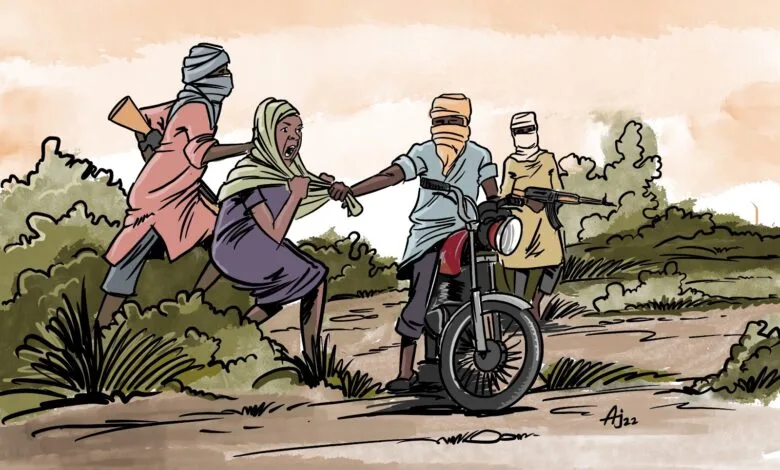Rising Insecurity Fuels Kidnapping Crisis
A recent report by SBM Intelligence reveals a startling trend in Nigeria’s escalating insecurity. Between July 2023 and June 2024, Nigerians paid a staggering N1.04 billion as ransom to kidnappers.
The report, titled “Grim Reaping,” underscores the deepening crisis of kidnapping in the country, driven by economic hardship and a shrinking pool of affluent targets.
Join our WhatsApp ChannelAccording to SBM Intelligence, kidnappers across Nigeria initially demanded around N10.99 billion in ransom during the period under review.
However, only about 9.5% of this amount, or N1.04 billion, was eventually paid by victims’ families. The report indicates that this reflects not just the negotiation tactics of the victims’ families but also the economic realities faced by many Nigerians.
“The situation is dire,” said Cheta Nwanze, a lead researcher at SBM Intelligence. “What we are seeing is a shift in the types of targets kidnappers are going after. As the wealthy become harder to target, kidnappers are focusing on a broader range of victims, which shows the insecurity problem is worsening.”
Complex Security Challenges in Nigeria
Nigeria’s security landscape has become increasingly complicated, with various forms of violence contributing to the overall insecurity.
The resurgence of Boko Haram in the Northeast, banditry in the Northcentral and Northwest, secessionist movements in the Southeast, and gang-related disturbances in the Southwest are all part of this troubling picture.
The report highlights that kidnapping for ransom has emerged as a common thread uniting these diverse security challenges. It cuts across regions and socioeconomic statuses, making it a nationwide concern.
READ ALSO: Insecurity, High Interest Rate Hamper Business Activities In Nigeria – Report
Between July 2023 and June 2024, at least 7,568 individuals were abducted in 1,130 incidents across the country.
The states with the highest rates of kidnapping incidents include Zamfara, Kaduna, and Katsina. Zamfara alone reported 132 incidents involving 1,639 victims, while Kaduna and Katsina had 113 and 119 incidents with 1,113 and 887 victims, respectively.
In addition to the high number of abductions, these states also recorded the highest number of civilian deaths. The report revealed that 1,056 people were killed in these incidents, indicating that kidnapping in Nigeria is becoming increasingly deadly. On average, every attempted kidnapping now results in at least one fatality.
Insecurity and Its Economic Impact
The economic impact of Nigeria’s worsening insecurity is profound. The agricultural sector, in particular, has been severely affected.
Farmers in many northern states have been forced to pay ransom just to access their land and harvest their crops. In some tragic cases, farmers have been kidnapped and killed during these attempts.
A separate report by SBM Intelligence noted that over 1,356 farmers have been kidnapped since 2020, with many paying up to N100,000 as a “fee” to kidnappers to continue farming. This has contributed to the ongoing food crisis in Nigeria, where food inflation reached 40% this year, the highest in nearly three decades.
“Insecurity is killing the economy,” said Nwanze. “When farmers are unable to work their land safely, it directly affects food supply and prices. This creates a ripple effect that impacts everyone, especially the most vulnerable in society.”
The Geography of Ransom Payments
The report also provided insights into the geography of ransom payments. The Federal Capital Territory (FCT) recorded the highest ransom demands, with Lagos and Kaduna following closely behind. In the Southeast, despite lower overall numbers of kidnappings, the amount of ransom paid and the rate of successful collections were notably higher.
A troubling trend identified by the report is the increasing demand for in-kind payments by kidnappers. In the South, these payments often include food, drinks, and cigarettes, while in the North, motorcycles are frequently requested. This indicates that kidnappers are becoming more adaptive and are diversifying their demands to suit regional dynamics.
Women have become more frequent targets in these kidnapping incidents. The report suggests that while the South has seen only a modest increase in kidnappings from 2022 to 2024, the North has experienced a significant surge.
This year alone, the number of incidents in the North has surpassed the combined totals of the previous two years, pointing to a rapidly deteriorating situation that is becoming increasingly difficult to manage.
As Nigeria continues to grapple with these complex security challenges, the cost of insecurity, both in human lives and economic terms, is becoming ever more apparent. The grim figures in the report serve as a stark reminder of the urgent need for comprehensive solutions to address the root causes of insecurity in the country.
Emmanuel Ochayi is a journalist. He is a graduate of the University of Lagos, School of first choice and the nations pride. Emmanuel is keen on exploring writing angles in different areas, including Business, climate change, politics, Education, and others.
- Emmanuel Ochayihttps://www.primebusiness.africa/author/ochayi/
- Emmanuel Ochayihttps://www.primebusiness.africa/author/ochayi/
- Emmanuel Ochayihttps://www.primebusiness.africa/author/ochayi/
- Emmanuel Ochayihttps://www.primebusiness.africa/author/ochayi/




















Follow Us